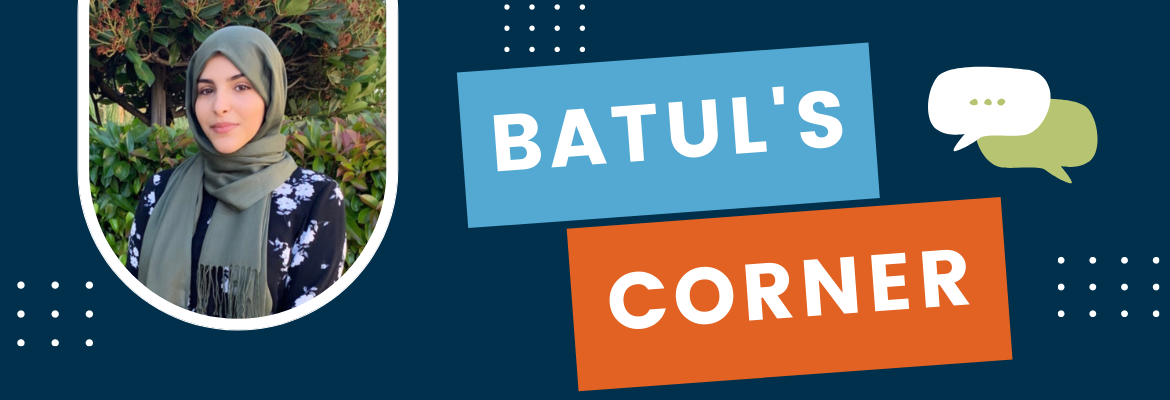#2. Tapping Your Mentor’s Knowledge
In 2021, I applied for and was granted the Global Internship Program with UC Berkeley during the summer. Through this experience, I had the opportunity to complete hours of research on water irrigation systems and the implications of war on infrastructure in my home country, Yemen. Without my mentor, Anna, I would have never applied for this internship. This was an amazing educational experience, and it was with the support of Anna that I pushed myself to apply for the program.
One day, Anna and I scheduled a time to hang out on UC Berkeley’s campus to catch up on life, school, and work. It was a normal and casual conversation. We laughed and shared our struggles, what we were working on, contemplated goals and aspirations for the future, and more. At one point, I expressed to Anna my interest in working in government or policy. That’s when I learned that she worked in government for over 10 years. After our chat, Anna kindly sent me a list of resources and opportunities within policy and government (see below!), one of them being the Global Internship Program at UC Berkeley!
I share this story in hopes of providing other scholars with an example of ways to use our mentors and the importance of scheduling consistent conversations. We forget that mentors too have completed college, looked for jobs, and have experience in fields that we aspire to work in. We also forget that they are kind and eager enough to share these resources with us, but are waiting for us to do one simple thing—ASK. Surely, you will benefit from every exchange with your mentors, and they are always willing to provide us with the information and resources they have at their disposal to help us succeed!
Ways Your Mentor Can Help You
There are so many ways in which we can utilize our mentors and what they have to offer, to push ourselves towards our academic goals and aspirations. However, it takes time to find out your mentor’s strengths and abilities, which will allow you to figure out the best way to work with them. Find out what your mentor can do and seek assistance from others if they cannot help you. Below, I’ve listed some ideas for how to make the most out of our amazing mentors, that will help you flourish in your desired field of study!
Tips & Ideas
Academically
- Do virtual or in person study sessions. Some mentors are able to help when you’re struggling through midterms or papers. It truly doesn’t hurt to ask your mentors if they’re okay and comfortable with helping you when you need it. It’s also extremely helpful to study together even if you and your mentor are both working on separate projects and work!!
- Schedule a time either through phone call, zoom or in person to help with revision → Mentors are skilled professionals in many fields! For example, my Mentor Anna studied English and is very skilled in writing and editing papers. Ask your mentor if they can offer help with editing, revising, or other kinds of academic help.
- If you’re like me and need help with organizing your schedule, get your mentor to help you set those reminders on Calendly or other software they are familiar with → this will keep you on track!
- If you ask your mentor for academic support and they can’t, don’t be discouraged. This is not because they don’t want to help you. Instead you should ask them if they can help you find the support that you are seeking.
- Your BCS College Success Advisor is also a great resource to get support and help from if your mentors can’t assist you in your area of expertise or interest!
Professionally
- Ask your mentors if they know of any opportunities in your field. I was interested in politics and government. My mentor, Anna, has over 10 years of experience working in the government. By sharing my interests with her, she knew to provide me with a list of government jobs, opportunities and internships that I was able to apply for as an undergraduate!
- If your mentor does not work in your field of interest → Ask them if they know anyone they could connect you with instead. This is how you build connections!
- Mentors might be able to assist you with work resumes and cover letters. They have experienced far more than we have and have had plenty of practice in perfecting their own resumes!
- Job Interviews? Practice with your mentor → Interview Q&As , Elevator Pitches… Complete run throughs with your mentor, have them ask questions that would possibly be asked at your next job interview. Mentors are supportive and will help us with anything.
Here’s Anna’s list of Foreign Affairs Internships & Resources for anyone interested.

Batul Aledlah
BCS Intern, 2018 High Hopes ScholarBatul is a passionate and hardworking BCS transfer student studying Ethnic Studies at UC Berkeley. She will be graduating this Spring, officially making her a first-generation college graduate. Batul has also obtained education in Political Science and Psychology, which are both fields she wishes to pursue in the near future after earning her Bachelor’s degree. In hopes of becoming an advisor or counselor, Batul aims to commit time and dedication to internships and volunteer work centered around peer mentorship for scholars like herself.


One Response to “#2. Tapping Your Mentor’s Knowledge”
muna
Awesome work, Batul. I agree that it’s almost crucial to know what your mentor(s) strength and weaknesses are so ensure you can get the best possible help available. I can see myself using these tips in the near future. Thanks so much, Batul!